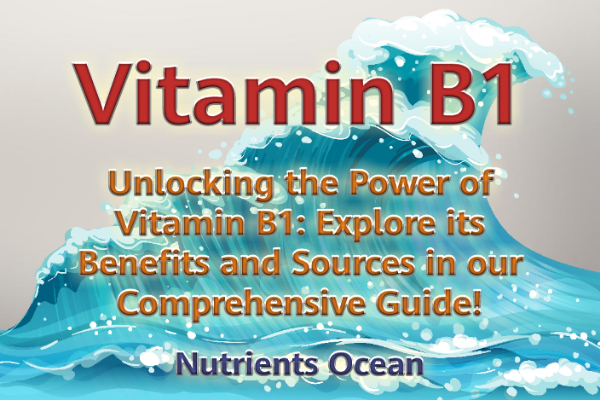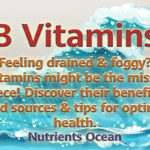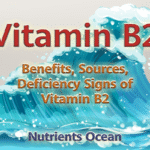Vitamin B1 (Thiamine)
Feeling sluggish? Struggling to focus? Vitamin B1, also known as thiamine, might be the missing piece in your puzzle. This essential nutrient plays a crucial role in keeping you energized, focused, and feeling your best.
But what exactly is vitamin B1, and why is it so important?
Think of vitamin B1 as the spark plug of your body. It helps convert food into energy, ensuring your cells have the fuel they need to function properly. It also supports the nervous system, promoting healthy brain function and aiding in nerve impulse transmission.
Benefits of Getting Enough Vitamin B1
Boosts Energy Levels
Feeling tired and drained? Vitamin B1 can help combat fatigue by aiding in energy production.
Supports Brain Function
Adequate B1 levels are crucial for cognitive function, memory, and concentration.
Promotes Nervous System Health
B1 plays a vital role in nerve impulse transmission, contributing to healthy nerve function.
May Improve Mood
Studies suggest B1 deficiency might be linked to low mood and depression. Ensuring sufficient intake could potentially support emotional well-being.
How Much Vitamin B1 Do You Need?
The recommended daily intake of vitamin B1 varies depending on age, sex, and overall health. However, adults generally require around 1.1-1.2 milligrams (mg) per day.
Food Sources Rich in Vitamin B1
Beans and legumes
Lentils, black beans, and chickpeas are packed with B1 and other essential nutrients.
Nuts and seeds
Sunflower seeds, peanuts, and almonds offer a good dose of B1 alongside healthy fats.
Whole grains
Brown rice, quinoa, and whole-wheat bread are excellent sources of B1 and fiber.
Fortified foods:
Many breakfast cereals and grain products are fortified with B vitamins, including B1.
Vegetables Rich in Vitamin B1
-
Potatoes:
A classic and versatile source, offering a good amount of B1 per
serving, especially with the skin on. -
Spinach:
This leafy green powerhouse is not only rich in B1 but also boasts other essential vitamins and minerals. -
Asparagus:
Enjoy this spring vegetable for its delightful flavor and B1 content, contributing to your daily needs. -
Brussels sprouts:
These miniature cabbages pack a punch of B1 alongside fiber and other beneficial nutrients. -
Edamame:
Soybeans in their pod form offer a good source of plant-based protein and vitamin B1. -
Peas:
Sweet and crunchy, peas are a delightful snack or addition to meals, providing a dose of B1 along with other vitamins.
Fruits Rich in Vitamin B1
Oranges
A quintessential source of vitamin C, oranges also offer a decent amount of B1, making them a well-rounded choice.
Grapefruit
Similar to oranges, grapefruit provides both vitamin C and B1, contributing to your daily intake.
Dried fruits
Options like raisins, apricots, and prunes offer concentrated sources of various nutrients, including B1, in a convenient and portable form.
Kiwi
This vibrant green fruit is not only delicious but also rich in
vitamin C and B1, making it a nutritious addition to your diet.
Cantaloupe
Enjoy the refreshing sweetness of cantaloupe while reaping the benefits of its vitamin B1 content.
Strawberries:
These juicy berries are a delightful source of vitamin C and also offer a small amount of B1.
It’s worth mentioning that this list is not exhaustive, many other fruits and vegetables
contain varying amounts of vitamin B1.
Animal Foods Rich in Vitamin B1
Organ meats
Liver, kidney, and heart are particularly rich in B vitamins,
including B1. However, due to their high concentration of certain nutrients, it’s important to consume them in moderation.
Salmon, trout, tuna, and sardines are excellent choices, offering B1 alongside omega-3 fatty acids and other beneficial nutrients.
A complete protein source, eggs also contain a good amount of B1, making them a well-rounded breakfast option.
Milk, yogurt, and cheese can contribute a small amount of B1 to your diet, especially when choosing fortified options.
It’s important to note that the B1 content in animal foods can vary depending on factors like the animal’s diet and cooking methods. Opting for lean cuts, avoiding processed meats, and incorporating a variety of these sources can help ensure you’re getting enough vitamin B1 from animal products.
Signs of Vitamin B1 Deficiency
While uncommon in developed countries, B1 deficiency can occur due to various factors like poor diet, alcoholism, or certain medical conditions.
Here are some potential signs:
- Fatigue and weakness
- Loss of appetite
- Weight loss
- Irritability and confusion
- Muscle weakness and tingling
- Difficulty concentrating
By understanding the importance of vitamin B1 and incorporating its rich sources into your diet, you can unlock your energy potential and support your body’s natural ability to thrive. So, ditch the sluggishness and embrace the vibrant energy that B1 can help you achieve!




